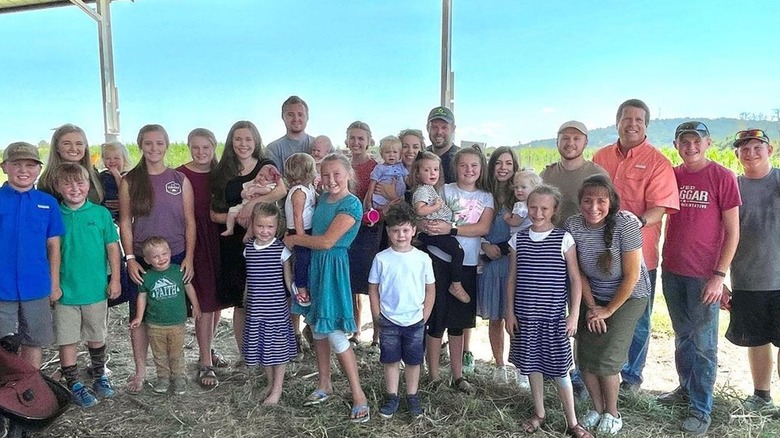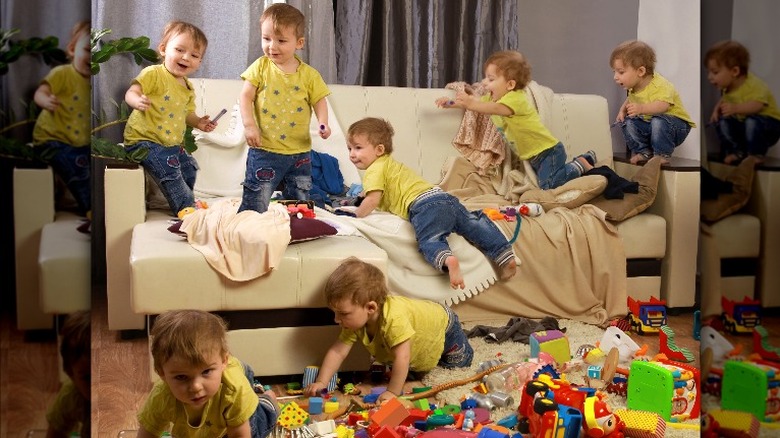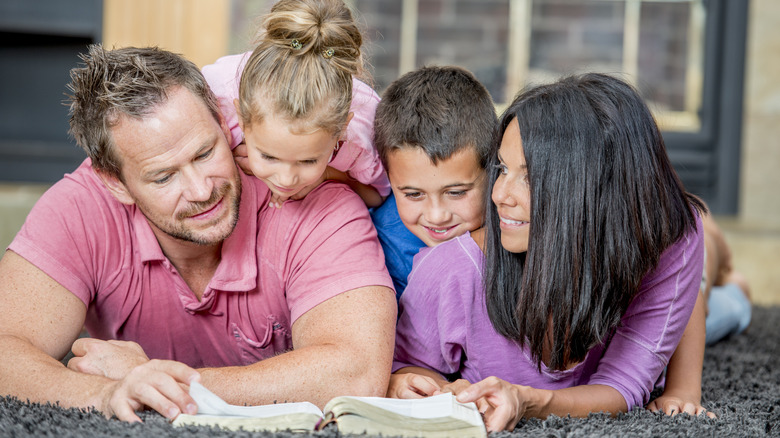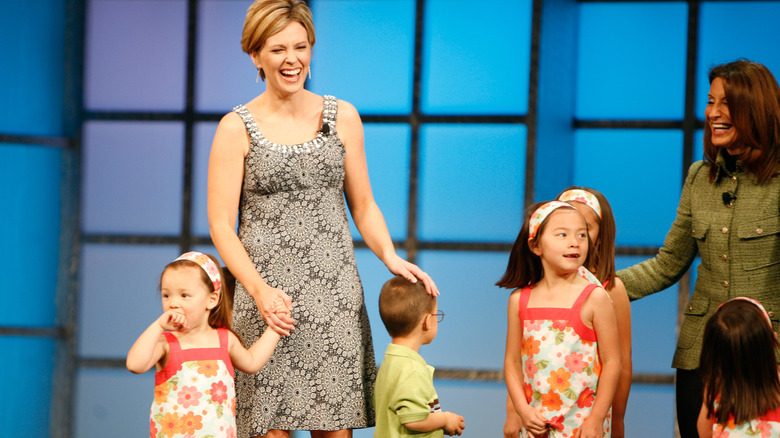Op-Ed: The Duggars' Downfall Should Spell The End Of Mega-Families On TV
Admittedly, "19 Kids & Counting" made for enjoyable viewing when we thought the Duggars were just a big, quirky bunch. We accepted their old-fashioned dress code (just a step less modest than the Amish), their buddy system in which daughters became mini-moms, and the endless episodes devoted to the marriages and pregnancies of the older siblings. (Well, who doesn't love weddings and babies?) But now that we know better, it's not fun anymore. Between the horrific acts of oldest son Josh, his parents' attempts to cover up those deeds, and the Amazon docu-series "Shiny Happy People: Duggar Family Secrets," the Duggar family's clean-cut rep is muddied forever. The odds of their getting another reality series anytime soon are about as good as the chances of mom Michelle donning a string bikini. Okay, maybe 10 years down the road we'll see the cameras following young Josie as she enters Harvard Law School or becomes a WWE wrestler, but we're not holding our breath 'til then.
Disagree with us if you will (and you just might), but we'd be happy if the mega-family TV trend ended altogether. There's a lot that goes on behind those families' tidy suburban doors, and it's getting harder to pretend that their lives are as joyful as they seem. In fact, glorifying the families may be helping them hide the truth of their lives.
The shows make raising large families look easy
Raising one or two children is challenging enough for any parent. Multiply that by three or four (or more!), and the mess, stress, and financial issues increase. There are other drawbacks as well. A 2016 study from the Institute of Economic Research (as reported by ATTN) found that children from large households tend to have less education and earning power. Oldest siblings fare worst of all, with lower cognitive scores and a higher risk of criminal activity. (Maybe it's not a coincidence that oldest son Josh Duggar is the one who ended up in jail.) The researchers speculate that parents of big families simply don't get enough individual bonding time with each of their children.
Yet, looking at the mega-family reality shows, you'd never know those problems existed. Sure, there might be an occasional episode in which the kids all come down with stomach flu at the same time, or the freezer goes on the fritz with a month's worth of meat inside. But those problems are neatly resolved by the end of the hour; you don't see the parents losing sleep over the astronomical bills, or the adult children struggling to find work with only a high school diploma. On the contrary, they suggest raising a large brood is easy if you just shop at thrift stores and keep your planner up to date. Of course, getting a hefty TV paycheck helps, too.
There are serious risks in having a huge family
Series about big households always show the fun part of pregnancy, like the inventive gender reveals (Jed and Katey Duggar's ranks among the wildest), and the adorable bee-themed baby showers. But behind all that heartwarmingness is the unpleasant truth of health risks. Even a first-time mom can suffer such serious complications as gestational diabetes, high blood pressure, placenta previa, kidney failure, and hemorrhaging. Beating the odds becomes ever more unrealistic for mothers opting to have child after child. Multiple-child pregnancies only increase the risk of premature birth, hypertension, and anemia, according to Johns Hopkins University; health risks and birth abnormalities are also more common in women over 35. Then there are the emotional costs. Karen Derrico of "Doubling Down with the Derricos" sought therapy to deal with the grief over her multiple miscarriages, and admitted she had prioritized her family's needs over her own (per People).
Having been almost constantly pregnant in a 21-year span, Michelle Duggar is well aware of the strain her body has been through. Josie, her youngest, was born nearly four months prematurely and suffered numerous health crises early on. Even after her last pregnancy ended in stillbirth, Michelle refused to say she was through. In 2014, at 48, the mega-mom consulted a specialist to see if she could safely conceive again if God willed it. At that point, another pregnancy would have been not so much a miracle as a dangerous, unnecessary gamble, but "19 Kids" downplayed that point.
The families promote extremist religions
Apart from numbers, the one thing supersized TV families have in common is their religion. Most identify as practicing Christians, which in itself isn't problematic; what is troubling is the families' right-wing leanings and the lack of counterbalance on the air. The Bates and Duggar families' opposition to abortion is well known, and both Jim Bob Duggar and son Jed unsuccessfully ran for state office on "pro-gun, pro-family" platforms. Farther west, the Browns of "Alaska Bush People" were rattled when son Bear revealed he was dating a pansexual woman.
What's more, these families are usually members of extremist church groups. Kim and Barry Plath are fundamentalists who shielded their kids from secular influences as long as they could. The "Sister Wives" family belongs to a branch of Mormonism that still believes in polygamy. The Duggars and Bates are members of the Institute in Basic Life Principles (IBLP), whose restrictive rules forbid everything from mainstream media to necklaces that hang too low. (This is considered an "eye trap" that could tempt a man to sexual assault.) Families in the IBLP are often large because of the group's ban on birth control; women are taught to aspire to motherhood and to let God dictate the number of children they have, regardless of their health or financial situation.
Reality shows add to the problem by presenting the families as offbeat, or even morally superior: Look — the kids are playing gospel music together instead of making TikToks in their rooms! It only serves to hide the underlying dangers of these fringe religious groups.
Unhappy family secrets often lie under the TV surface
Sometimes reality shows get a little too real. Time and again, we've seen oversized TV families fall apart in the face of feuding, shocking secrets, and even criminal activity. Kim and Barry Plath saw their marriage crumble and several of their children renounce their sheltered life. Kody Brown's polygamist life went south when three of his four wives left him (via People). Deon Derrico has been accused of numerous counts of theft and fraud, according to the Las Vegas Review-Journal — including a claim from his adoptive son that Derrico took out loans and credit cards in his name. Then, of course, there are the Duggars, still reeling from Josh Duggar's prison sentence for vile acts against the most innocent victims.
Then there's the sad case of "Jon & Kate Plus 8." Jon and Kate Gosselin's bitter split was followed by an awkward custody situation as two of the sextuplets opted to live with their dad. Collin and Hannah Gosselin are now making shocking claims against their mother in a VICE TV special. Kate, they say, took out her anger on Collin, labeling him as the troublemaker and separating him from family meals and playtimes.
Did they all break under the stress of living under the camera's eye, or would their problems have happened regardless? Either way, marketing mega-families as entertainment does no favors to either the viewers or the families. You want to have a dozen children? Go for it. Just don't ask us to watch.



